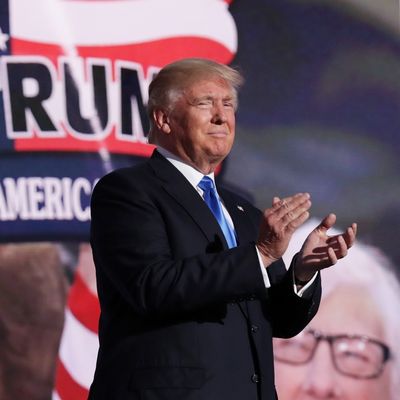
The Republican Party came into its convention in Cleveland politically split — less over policy than over the personal fitness of Donald Trump to serve as president. The purpose of the first night of the convention was to remind Republican loyalists of the fundamental identity markers that bind them to their party, regardless of its nominee: the maintenance of traditional social hierarchies bound by respect for authority. But two obstacles were immediately apparent.
The first was that the elite schism had left Trump’s party badly deprived of first-rank political talent to deliver its message. Fearing that their appearance in Cleveland would leave them with a stench of Trumpism after November, the party’s brightest lights mostly steered clear. Trump had insisted speakers were lining up for the chance to orate on his behalf, but all the evidence pointed in the opposite direction. The celebrities Trump had floated — Tom Brady, Jack Nicklaus — were nowhere to be found. Instead, his message was carried by a series of speakers who were obscure, crazy, obscure and crazy, or Melania Trump, who couldn’t very well say no.
Here was Antonio Sabàto Jr., star of soap operas and reality television, who “absolutely” believes President Obama is Muslim. There was Scott Baio, star of the Happy Days spin-off Joanie Loves Chachi. Baio had recently tweeted out a photo of Hillary Clinton in front of the letters c-u-n-t. Convention speeches usually brim with what is billed as rising stars, but the only speaker who remotely appeared to have a future in politics was Arkansas senator Tom Cotton. Trump actually counter-programmed his own speakers, giving a Fox News interview during one, and a Golf Channel interview during another.
The larger problem faced by the party was that the substantive foundation for its message had collapsed. For most of the postwar era, anticommunism supplied the basis for Republicans to demonstrate their manful authority. Eight or 12 years ago, the Iraq War and 9/11 — Republican rhetoric treated the two events as essentially synonymous — filled that role. But the collapse of the Iraq War, which has grown so unpopular Trump pretends to have opposed it from the beginning, left a void where the party’s agenda was supposed to reside. Incredibly, Rudy Giuliani managed to deliver an entire speech without even mentioning 9/11. There is not even a story of the candidate’s personal bravery or service, not even in something like the Texas National Guard, on which to hang a myth of the candidate as manly protector of the nation.
Instead, the security message splayed around a mishmash of subjects. There were paeans to the virtue of the police and the troops, sneering at the liberals (“They don’t hang out with regular folks like us who actually hunt and fish and pray and actually work for a living”), and denunciations of political correctness. The message, as Avik Roy, a former adviser to Rick Perry and Marco Rubio, put it, was that “Brown people are making America less safe.”
The prominence of Benghazi was in part a result of the programmatic vacuum. The attack in Benghazi was a conventional failure of intelligence to anticipate and quickly process a sudden attack in a chaotic environment. Republicans have used the episode instead to whip up crackpot conspiracy theories, according to which Hillary Clinton was complicit in the murder of Americans serving abroad. Benghazi was the event that revealed Clinton as an outsider, on the side of Them. By the standards of a convention, Trump’s name came up with shocking infrequency. His endorsement came largely by implication — Trump was the candidate who identified with authority, and would never betray out of misguided social liberalism. The message to wavering Republican loyalists was, whatever your qualms about Trump, at least he is one of us.






























